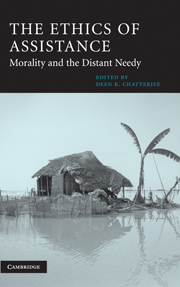Book contents
- Frontmatter
- Contents
- Notes on contributors
- Preface
- 1 Introduction
- PART I THE ETHICS OF DISTANCE
- PART II COMMUNITIES AND OBLIGATIONS
- PART III THE LAW OF PEOPLES
- PART IV RIGHTS, RESPONSIBILITIES AND INSTITUTIONAL REFORMS
- 11 Thickening convergence: human rights and cultural diversity
- 12 Global justice: whose obligations?
- 13 “Assisting” the global poor
- Index
13 - “Assisting” the global poor
Published online by Cambridge University Press: 05 June 2012
- Frontmatter
- Contents
- Notes on contributors
- Preface
- 1 Introduction
- PART I THE ETHICS OF DISTANCE
- PART II COMMUNITIES AND OBLIGATIONS
- PART III THE LAW OF PEOPLES
- PART IV RIGHTS, RESPONSIBILITIES AND INSTITUTIONAL REFORMS
- 11 Thickening convergence: human rights and cultural diversity
- 12 Global justice: whose obligations?
- 13 “Assisting” the global poor
- Index
Summary
We citizens of the affluent countries tend to discuss our obligations toward the distant needy mainly in terms of donations and transfers, assistance and redistribution: how much of our wealth, if any, should we give away to the hungry abroad? Using one prominent theorist to exemplify this way of conceiving the problem, I show how it is a serious error – and a very costly one for the global poor.
In his book The Law of Peoples, John Rawls adds an eighth law to his previous account: “Peoples have a duty to assist other peoples living under unfavorable conditions that prevent their having a just or decent political and social regime.” The addition is meant to show that Rawls' proposal can give a plausible account of global economic justice, albeit a less egalitarian one than his cosmopolitan critics have been urging upon him. This newly added duty is, however, more than Rawls', account can justify and less than what is needed to do justice to the problem of world poverty.
It is doubtful that the new amendment would be adopted in Rawls' international original position, which represents liberal and decent peoples only. Each such representative is rational and seeking an international order that enables his or her own people to be stably organized according to its own conception of justice or decency. Such representatives may well agree to assist one another in times of need.
- Type
- Chapter
- Information
- The Ethics of AssistanceMorality and the Distant Needy, pp. 260 - 288Publisher: Cambridge University PressPrint publication year: 2004
- 49
- Cited by



